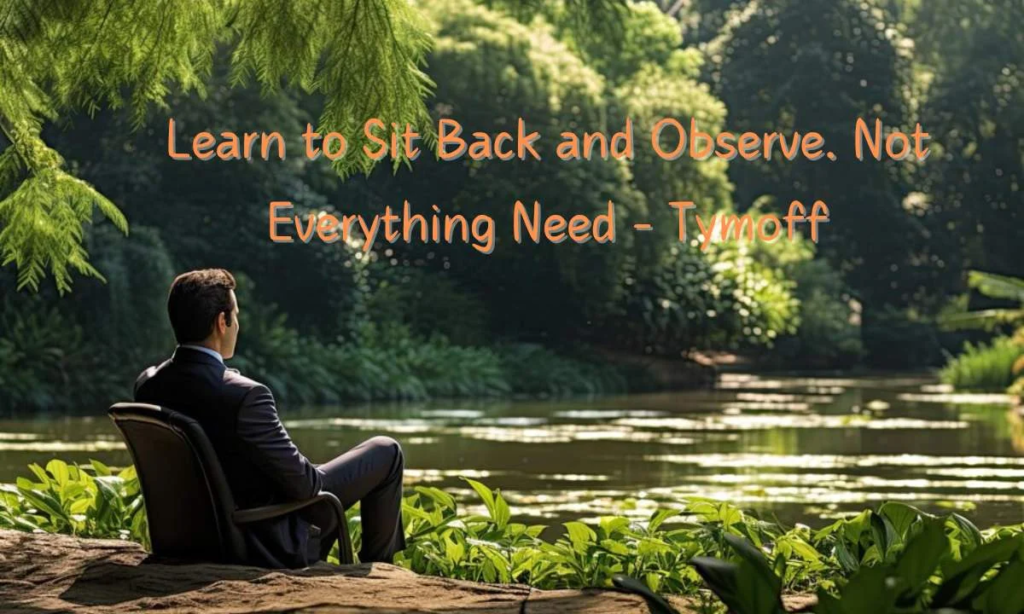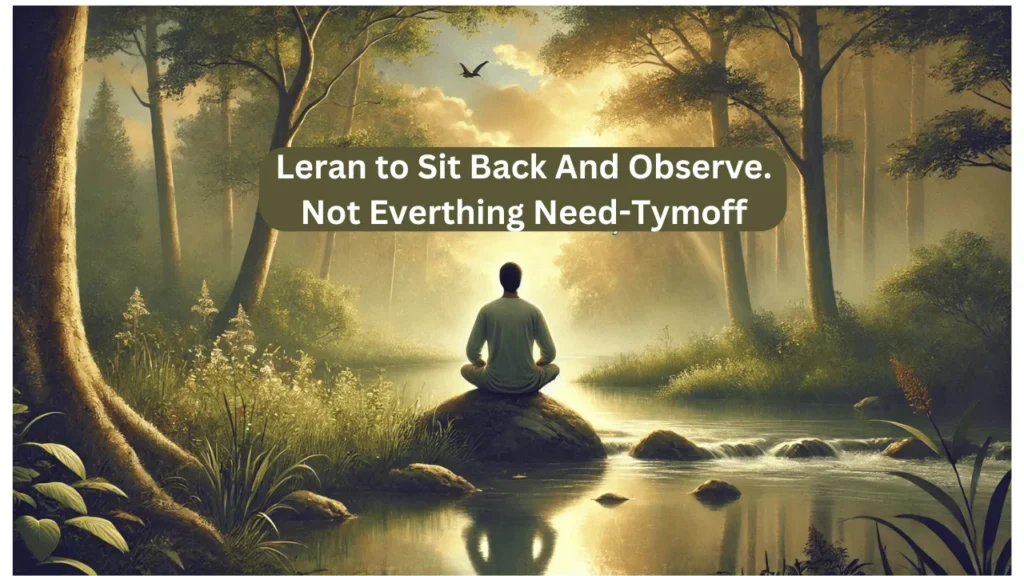In the age of constant connectivity and rapid information flow, the modern world encourages a relentless pursuit of action and engagement. Whether it’s responding to emails, joining group chats, or making fast decisions, our lives have become so intertwined with activity that it’s easy to lose sight of the power of stillness and observation. In the words of the phrase, “Learn to sit back and observe. Not everything need – Tymoff,” there is a profound reminder to slow down, detach, and create space for thoughtful reflection rather than immediate reaction.
This idea isn’t just a philosophical notion but a practical tool to help us navigate the pressures of daily life with calm and clarity. The ability to step back, observe, and not rush to participate in every situation is a practice that can transform the way we experience the world. Let’s explore the meaning behind this powerful phrase and how embracing it can lead to a more balanced, peaceful life.
The Rush of Modern Life: A Call for Mindful Detachment
Today, we live in a world where information, social interactions, and notifications bombard us from every direction. The pressure to stay updated, respond quickly, and make swift decisions can often feel overwhelming. In such an environment, the idea of “sitting back and observing” seems almost counterproductive. After all, aren’t we supposed to be constantly moving forward, reacting to situations, and staying engaged?
However, the reality is that the constant rush and need to be involved in everything can lead to stress, burnout, and poor decision-making. When we’re always on the go, we risk acting impulsively, without thinking through our responses or considering the bigger picture. In these moments, learn to sit back and observe. Not everything need – Tymoff becomes a guiding principle.
By learning to step back from situations, we create space to reflect, reassess, and respond with more clarity and intention. This practice of observation is not about disengagement but about being present without the need to act immediately.
Understanding the Power of Observation
To “sit back and observe” involves developing a keen sense of awareness. It requires mindfulness—the ability to be fully present in the moment without judgment or the urge to control or react to everything around us. When we practice observation, we become more attuned to our surroundings, to others, and to our inner thoughts and emotions.
Being observant means looking beyond the surface of situations. It’s about noticing patterns, recognizing our emotional responses, and becoming aware of how external events impact our mindset. It’s about seeing things without the need to immediately fix or change them.
Here’s what learning to observe can teach us:
1. Patience and Emotional Control
When we learn to sit back and observe, we give ourselves the gift of patience. Instead of jumping to conclusions or reacting to every situation, we allow ourselves time to process and reflect. This gives us more emotional control, which is crucial for navigating both personal and professional relationships.
Imagine a situation at work where someone makes a comment that irks you. Rather than immediately firing back with a defensive response, you take a moment to observe how you feel. You might realize that your reaction is rooted in insecurity or a past experience rather than the comment itself. This awareness helps you choose a more measured response, fostering better communication and understanding.
2. Better Decision-Making
When we’re constantly reacting and making decisions on the fly, we risk making choices driven by impulse or emotion. But when we step back and observe, we allow ourselves to see the bigger picture. We can assess the situation more holistically and make decisions that align with our long-term goals, not just immediate desires.
For example, if you’re facing a major life decision, such as changing jobs or moving to a new city, taking the time to observe the situation from various angles—rather than rushing to make a choice—can help you make a more informed and thoughtful decision.
3. Enhanced Empathy and Understanding
Observing without immediate judgment or response helps to develop empathy. When we take the time to listen to others, to truly observe their words, tone, and body language, we gain a deeper understanding of their perspective. This ability to be present with others fosters stronger relationships built on mutual respect and understanding.
In conversations, instead of interrupting or waiting for your turn to speak, focus on listening attentively. Notice not just what the other person is saying but how they are saying it. This deepens your connection with them and can help resolve conflicts more effectively.
4. Self-Awareness and Personal Growth
Observing isn’t just about the external world; it’s also about turning the lens inward. When we sit back and observe our own thoughts, feelings, and reactions, we begin to understand ourselves better. This self-awareness is the first step toward personal growth.
By observing our patterns of thought, we can identify negative or limiting beliefs that may be holding us back. We can recognize how stress, fear, or anxiety might be influencing our behavior. With this awareness, we can make conscious choices to change and grow.
The Benefits of Detachment in a Constantly Moving World
At first glance, detachment may seem like a form of withdrawal or disengagement. However, detachment, in the context of learn to sit back and observe. Not everything need – Tymoff, is about freedom—freedom from the need to always be involved, to always react, and to always fix things. It’s about creating a healthier relationship with the world and the people around us.
Let’s explore some key benefits of adopting a more detached, observant mindset:

1. Reduced Stress and Anxiety
Constant engagement and decision-making lead to mental fatigue and stress. By stepping back and practicing observation, you can reduce the mental load. You no longer feel the need to control every aspect of your life. Instead, you learn to trust the process and let things unfold as they will.
For instance, when faced with a challenging situation, instead of immediately jumping in to solve it, you allow time for things to settle. You give yourself permission to pause, which can help you approach the issue with a clearer and calmer mind.
2. Better Mental Clarity
When we’re constantly reacting and multitasking, our minds can become cluttered, making it harder to think clearly. Sitting back and observing allows our minds to clear, enabling us to focus on what truly matters. This mental clarity helps us make better decisions, prioritize effectively, and maintain a sense of balance in our lives.
3. Improved Problem-Solving Abilities
Observation helps us identify the root causes of problems instead of simply treating symptoms. When we take the time to observe, we gain insights into the situation that we might have missed in a rush to fix things. This deepened understanding allows us to approach problems from a more effective and creative angle.
How to Cultivate the Practice of Observation
The key to embracing learn to sit back and observe. Not everything need – Tymoff is consistent practice. Cultivating observation requires intentional effort, but with time, it becomes second nature. Here are some practical ways to develop this mindset:
1. Mindfulness Meditation
Mindfulness meditation is an excellent tool for learning to observe without judgment. By sitting quietly, focusing on your breath, and letting thoughts come and go without attachment, you train your mind to be present without reacting. Over time, this practice extends beyond meditation and becomes part of your daily life.
2. Journaling
Journaling can help you process your observations. When you write down your thoughts, you create a space for reflection. This practice can help you identify patterns in your behavior and thoughts, leading to deeper self-awareness.
3. Practice Active Listening
When engaging with others, make an effort to listen actively. Pay close attention to their words, body language, and emotions. Don’t interrupt or try to immediately solve their problems. Simply listen and observe. This practice can enhance your relationships and make you a more empathetic and understanding individual.
4. Take Breaks from Digital Distractions
The constant flow of digital notifications can make it difficult to observe the present moment. Take intentional breaks from technology—whether it’s during meals, before bed, or when spending time with loved ones. Use these moments to reconnect with yourself and your surroundings.
5. Create Space for Silence
Silence is often overlooked in our noisy world, but it is essential for observation. Seek out moments of quiet where you can reflect without distractions. Whether it’s sitting in nature, taking a walk, or simply sitting in silence, these moments of peace allow you to observe and process your thoughts.
Conclusion: A Life of Reflection and Balance
Incorporating the principle of learn to sit back and observe. Not everything need – Tymoff into our daily lives can have profound effects on our mental, emotional, and physical well-being. By learning to observe rather than react, we can create more space for clarity, patience, and thoughtful decision-making.
In a world that celebrates constant action and engagement, taking the time to step back, reflect, and observe is an act of rebellion—a rebellion against stress, impatience, and the illusion of control. It’s a conscious choice to cultivate peace and balance within ourselves. By mastering this art, we not only improve our own lives but also enhance our relationships with others, create better solutions to problems, and develop a deeper understanding of ourselves.


